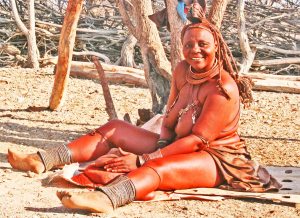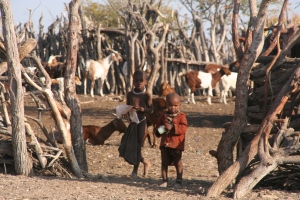 Of course the conversation ceased when the man walked down Voortrekker Weg. Not only is it unusual for Rolbos to be the final destination of any traveller, there was something else: it felt as if the man brought with him an atmosphere of ‘assured silence’ – as Gertruida tried to explain it later. Barefoot, dressed in his sheepskin coat and carrying his stick, he reminded Oudoom of an Old Testament prophet…or at least somebody with a story to tell.
Of course the conversation ceased when the man walked down Voortrekker Weg. Not only is it unusual for Rolbos to be the final destination of any traveller, there was something else: it felt as if the man brought with him an atmosphere of ‘assured silence’ – as Gertruida tried to explain it later. Barefoot, dressed in his sheepskin coat and carrying his stick, he reminded Oudoom of an Old Testament prophet…or at least somebody with a story to tell.
For once, Oudoom was right…
Boggel got on his crate to stare at the man: tall, handsome in a rugged way; with finely chiselled African features. The liquid-chocolate eyes blinked once when he entered Boggel’s Place before he smiled uncertainly in greeting.
Gertruida noticed the gap between the upper teeth – and the missing four lower incisors – and whispered to Precilla sitting next to her. “A Himba?” Although she said it as a question, she was fairly sure she’s right.
She was, as usual.
“Tjike…” The man lowered his eyes when he noticed the people in the bar. Realising that it was his way of saying hello, Gertruida twisted her tongue around the word in return.
“I speak English,” the man said kindly, “and I need to find Sergeant Ben. That’s why I am here.”
“Um…” Vetfaan faltered, unsure how too continue, ” we only have Sergeant Dreyer here. He’s the policeman.”
The man frowned, held up a hand; uncertainty – even fear – in his eyes. “Police?”
“Don’t worry. He’s not like that – he’s one of us.” Gertruida motioned for the man to come in. “Come sit here. You walked to Rolbos? You must be thirsty.”
“Ja, and we’ve been discussing the drought for days now.” Vetfaan smiled his encouragement. “We’d like to have something else to talk about. You’ve come far…so tell us about this Sergeant Ben?”
The man sat down with a relieved sigh. “I have to give Sergeant Ben something. It’s a matter of honour…”
***
It was a day like any other. The sun beat down on the little kraal where the women sat in front of the huts, watching the smaller children play in the dust. The men and older boys were out in the veld, keeping watch over the flock of goats and cattle. The drought caused them to roam wider into their ancestral territory, looking for patches of withered grass in the mountainous region. And water, of course. Always water. Late at night, around their fires, they told each other that something very bad must have happened; why else would the drought be so severe? The earth was unhappy: they knew the clouds would not release the rain when new growth would only serve to feed evil.
They knew about the war, of course. Only the previous week they heard the crump of distant explosions. They didn’t know the sound, didn’t recognise the crackle of automatic weapons – but they did understand that people were killing each other.
They had speculated about that. Why would men find it necessary to kill each other? Was Life not something to protect and preserve? All life – even that of the goats – had a purpose. Killing an animal to feed the hungry mouths in the kraal had a purpose. Killing a man…? And they had a long conversation around the fire, eventually agreeing that whatever reason the men had for such killing, must be wrong.
That’s why, the old men said, the rain stayed away.
 On that day the women sat in the sun, grinding ochre and hoping their husbands and sons would find a protected valley with grass and fresh water. Without their cattle and goats, they’d never survive. In the meantime, the best thing to do was to see to it that there were enough ochre and fat – when the men returned, they wanted to look their best.
On that day the women sat in the sun, grinding ochre and hoping their husbands and sons would find a protected valley with grass and fresh water. Without their cattle and goats, they’d never survive. In the meantime, the best thing to do was to see to it that there were enough ochre and fat – when the men returned, they wanted to look their best.
It was one of the little boys who saw the three men running towards the kraal.
“Look! Look! Men are coming – and they’re not Himba.”
 The First Wife, Miriam, glanced over to see what the boy was shouting about. When her husband was away, all authority and responsibility rested on her shoulders. At first she hoped the men would go past the kraal, leaving them in peace – but soon realised that was not to be. The men carried guns and that meant they have to be soldiers. They rushed through the kraal’s entrance without asking permission, brushing aside the two little boys who gaped at them.
The First Wife, Miriam, glanced over to see what the boy was shouting about. When her husband was away, all authority and responsibility rested on her shoulders. At first she hoped the men would go past the kraal, leaving them in peace – but soon realised that was not to be. The men carried guns and that meant they have to be soldiers. They rushed through the kraal’s entrance without asking permission, brushing aside the two little boys who gaped at them.
“Hide! We must hide!” The biggest of the three grabbed one of the boys, holding him up like a puppy. “And you lot will shut up. When the others come, you say nothing! Nothing!”
***
By now the entire population of Rolbos has gathered in the bar, listening to the Himba telling his tale. He sips his bottled water as he watches their faces – allowing the pause to create images in the minds of his audience. Telling a story – especially one as important as this – is an art. Rushing to the end won’t do. On the other hand, if the tempo is too slow, the listener loses interest. As a veteran of many a camp fire, the Himba understands the fine balance needed between telling, pausing, and feeding his audience just enough to keep them hungry for more. He knows every listener needs to become an observer of the unfolding scenes, making them see the story rather than simply listening to it. In this way, the observer becomes a participant – for is it not so that every story has the power to change people?
That’s why he sits back, allowing the image of the kraal, the desperate soldiers, the horrified First Wife and the frightened boy to become a reality in the little bar in Rolbos. And, like he knew it would, he watches faces change from mild interest to reflect the emotion he felt when that soldier grabbed him and dragged him into the sacred interior of the First House…
“And then…?” Vetfaan asks, his beer forgotten on the counter in front of him.
“Ah, yes. That’s when the horses came. The horses with the men and their guns. Many of them…”

Great writing as always boet. Compelling intro to what promises to be an amazing tale. Boy can you tell a story.
Thanks, Trevor
And you, like this Himba man, know when to pause.
*smile* … Thank you!
Sooo good to have you back! Missed it big time! Thank you very much for every one of them, they’re awesome!
Thank you so much, Christo. I’m glad if you enjoy Rolbos…
Hope this isn’t going to be a sad one…
*hugs*
It’s coming to me in pieces, so I’m still assembling the story. But..who knows? It happened during the war, and that wasn’t a happy time. Still, the man survived to tell his story, so there must be a silver lining somewhere…
Nice to read you again!
Welcome back 🙂
Thanks, Natasha!
I am at the camp fire listening intently, my anticipation……….
Thanks…the next episode at midnight…
Bloody hell i am glad there is another episode i was about to hunt you down and beat you over the head for leaving me up in the air
That’s a compliment! Thanks. Oh my…tonight (episode three) will be the one when I’ll need a helmet…